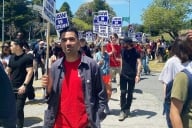You have /5 articles left.
Sign up for a free account or log in.
More than half of Jewish students at American colleges reported personally experiencing or witnessing anti-Semitism within the past six months, according to survey findings released Monday.
The findings should be a wake-up call to college administrators that Jewish students face real problems of bias, said Kenneth Marcus, president of the Louis D. Brandeis Center for Human Rights Under Law.
The report, based on the National Demographic Survey of American Jewish Students, was published jointly by Trinity College in Connecticut and the Brandeis Center. The researchers were Barry Kosmin and Ariela Keysar, professors of public policy and law at Trinity.
The report defines anti-Semitism as prejudice or discrimination against Jewish people, and says that can involve bigotry, bullying, defamation, stereotype or hate crimes. Whether a specific incident or event qualifies as anti-Semitic may be open to interpretation, but what matters is that the survey measures students’ perceptions, Kosmin said.
Of the 1,157 respondents at 4-year colleges, 54 percent said they’d been subjected to anti-Semitism since the beginning of the 2013-14 academic year. Among different demographics, the rate of experiencing anti-Semitism varied from 44 percent to 73 percent.
Aside from the high rate of students reporting discrimination, the findings also were surprising because it wasn’t the usual suspects who were reporting the discrimination, Kosmin said.
For example, 59 percent of women reported experiencing anti-Semitism, compared with 51 percent of men, and Conservative and Reform Jews reported higher rates of discrimination that Orthodox Jews. That’s surprising, the report says, since Orthodox men traditionally were the main targets of anti-Semitism, partially because they’re easily identifiable.
High rates of anti-Semitism also were reported at institutions regardless of location or type of institution, although rates tended to be higher at public colleges than private ones. A common excuse to ignore the issue has been that anti-Semitism was only a problem on few individual campuses, Marcus said. These data show it’s a much more pervasive problem.
Also noteworthy is the discrimination rate reported by students with different campus and political organizations. The rate of anti-Semitism was 73 percent for members of AIPAC, a vocal pro-Israel organization. But about half of student respondents who were affiliated with J Street, a group that is more sympathetic to the Palestinian cause and more critical of Israel's current government, also reported anti-Semitism. That dispels the belief that anti-Semitism is primarily perceived by supporters of Israel who object to criticism of Israel, according to the report.
The timing of this survey also is important, the authors note. It was conducted in March and April 2014, or before the war in Gaza broke out over the summer and caused a flare-up in tensions between pro-Israel and pro-Palestine campus groups.
People may think of anti-Semitism in extreme cases, the type of incidents that make news headlines. But the data from the survey suggest that’s not typical, and that discrimination instead occurs in low-level, everyday activities, such as name-calling or insulting stereotypes. In other words, Kosmin said, much of the discrimination is interpersonal.
The survey found that Jewish students feel their reports of anti-Semitism are largely ignored by the administration. That’s something the Brandeis Center frequently hears. A college tends to respond quickly if a swastika is spray painted on the side of a Jewish organization, as happened in recent months at Emory University and the University of California at Davis. But the response is much less reliable when anti-Israel events or comments cross the line into open hostility against Jewish students, Marcus said.
Studying the experiences of Jewish college students is particularly important given the generational gap in experiencing harassment, according to the report. The Pew Research Center found that 22 percent of Jewish people between the ages of 18 and 29 reported being called offensive names in the past year, compared with 6 percent of those older than 50.
A spokesman for Hillel International said in a statement that the organization will look closely at the survey results. But the Jewish campus organization’s own officials also have reported spending more time recently dealing with anti-Israel and anti-Semitic incidents than they have in previous years, and campuses should guard against overt and subtle forms of anti-Semitism, the organization said.
“We especially note that anti-Semitism seems to rise as a result of anti-Israel activity on campus, especially anti-Israel resolutions and referenda,” the statement said. Some pro-Palestine students have objected to such statements, saying that anti-Israel activity is being conflated with anti-Semitism.
The authors recommend several steps college officials should take, including adopting an official definition of anti-Semitism, providing staff training, adding questions about anti-Semitism to annual college surveys, developing a visible response to reports of anti-Semitism and learning more about the perpetrators. Colleges should also find out whether the national findings are true at their institutions, Marcus said.
“Officials need to ask themselves why it is that so many students are experiencing these problems and how they can be addressed.”








